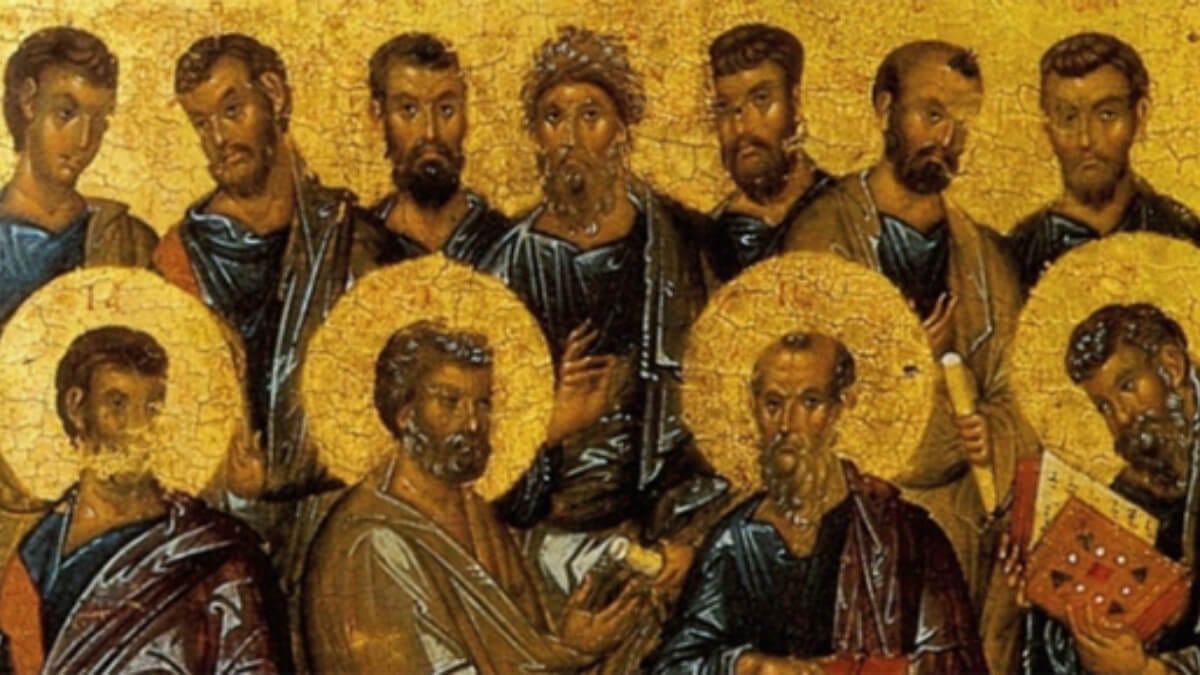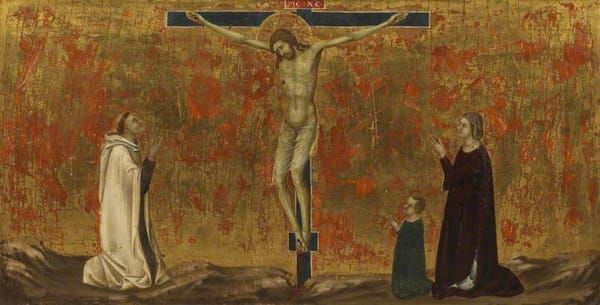A Heartfelt Rejoinder to Eugenia Constantinou: Discovering the Orthodox Phronema in Universalism
Tradition differs from an apostolic deposit, as the Nicene Trinity isn't explicitly taught in the New Testament and reflects varied early Christologies.

Eugenia Constantinou is an Orthodox theologian best known for her 2020 book Thinking Orthodox: Understanding and Acquiring the Orthodox Christian Mind, published by Ancient Faith Ministries. What follows is the first in a series of three posts that will review Constantinou’s book and address how her claims relate to the universalist position.
I approach this project from a shared Orthodox perspective with the hope that speaking to Constantinou and others who have similar commitments to her in this way will make them more open to the doctrine of universal salvation. I do not expect to convince anyone here, but I ask that you come to this with an open mind and humble spirit. This is not a polemic, and while partially a defense at times, this is mostly an expression of why it is not theologically irresponsible for an Orthodox Christian to believe in universalism.
The most crucial theme in Constantinou's book is the importance of establishing an Orthodox phronema. The Greek term can be translated into English as “mindset,” but it has a far richer dimension of meaning. Phronema can perhaps best be defined as a virtuous mindset that has both a practical element and a theoretical element to it. She writes, "It is a way of life based on complete faith and confidence in the Church."1 However, despite all the definitions one could apply to phromena, it remains indefinable. This should be no surprise for those familiar with apophatic theology, especially the Orthodox take on this perennial tradition. In its most extreme form, apophatic theology teaches that all we can know about God is what He is not, as the Jewish philosopher Maimonides taught. This extreme is rarely embraced by most apophatic theologians and certainly most Orthodox apophatic theologians. A common Orthodox stance on apophatic theology is that we can apply certain terms to describe God, such as St Dionysius the Areopagite’s Divine Names, but these merely approximate the divine and do not deliver a full understanding of God. As Ephesians 2:6 reads, Christ was seated in the heavenly realms after His resurrection, "Above […] every name that is named, not only in this Age but the Age to come." Constantinou adopts a similar stance: Phronema is indefinable, but when you know it, you know it.
This central theme is developed throughout her book in two relevant ways. The first is an emphasis on uplifting "holiness of mind." The second is an emphasis on uplifting "Tradition." These motifs interconnect. Constantinou eschews those who employ “deductive reasoning,” as she calls it, to justify or defend the Orthodox faith.2 Deductive reasoning is when one relies on one's faculty of reason to arrive at a theological truth. This opposes the holiness of mind, whereby philosophy and deductive reasoning are recognized as faulty, and a submission to Tradition is necessary. According to her, reason and faith are not at odds in Orthodoxy because faith in Tradition is always understood to be the true purpose of reason, and when one submits to Tradition, they preserve their reason; her "deductive reasoning" is analogous to what the Letter of James refers to as earthly [epigeios] wisdom. She explains without uncertainty, "The very essence of Tradition is to preserve what the apostles taught."3 As she says at another point, phronema is Tradition because it is not merely the deposit of the apostolic faith but how that faith is "appropriated and expressed as an entire way of life."4 Thus, when one adopts an Orthodox phronema, one adopts a holiness of mind; one's reason submits to Tradition and the deposit of the apostolic faith.
The rest of this series of posts will largely center on her two stipulations regarding Tradition and its relevance to universalism: Tradition is not valued because it is old; Tradition is not established by consensus.
Tradition and Antiquity
I agree that Tradition is not based on what is old, yet this seems to at least partially be in tension with her claim that Tradition is a deposit of the apostolic faith if left unqualified. Much of Tradition is certainly not apostolic, but it is old. Take a basic example: The Nicene Trinity. The trinitarian doctrine that Nicaea I dogmatized was not so much an apostolic deposit of the faith. New Testament scholars rarely agree on much, so it is remarkable that all scholars, Christian or atheist, accept that the trinitarian doctrine formalized at Nicaea I is not taught in the New Testament. The debate centers on how close Nicene doctrine is to the New Testament. This opens up another problem: The differing christologies and trinitarianisms of the New Testament texts. Does Mark’s gospel teach the same Christology as John’s gospel? Does John’s gospel teach the same Christology as Paul’s letters? Does Matthew’s gospel teach the same Christology as Paul’s letters? How does Revelation fit into all of this? And so on. This naturally leads us to ask, how does the Holy Spirit fit into all of this? Called by various names throughout the New Testament, the Holy Spirit [hagio pneumatos] is rarely discussed in much depth. One can easily fall down a rabbit hole of New Testament scholarship with just one of these questions.5
We can rely on Tradition to explain how all these diverging pictures of Christ and the Holy Spirit fit together, but this is not an apostolic deposit. Such a picture is way too crisp, and early Church history is anything but crisp. Other examples abound when considering what is considered Tradition yet probably not apostolic: traditional authorship claims and dates of the New Testament, Mary’s Dormition (“falling asleep”), Chalcedonian Christology (two natures of Christ), icon veneration, and so on. These and other truths in Tradition were not on the minds of the first Jesus followers and did not become so until a century (and often) centuries after His death. These only made their way into what we now refer to as Tradition through the writings of certain holy Fathers and, later, in some cases, the declarations of ecumenical councils received by the Church.
Yet even this blanket statement does not cover how certain doctrines, such as Mary’s Dormition, became accepted as Tradition. This tradition was first popularized by "heterodox" or "heretical" Christians around the late third century.6 Within a little over a century, Orthodox Fathers began to develop intrigue and reverence for it. Even still, the Dormition tradition was kept under wraps for at least another half century and was not formally recognized by the Church until 588, when it was added to the Byzantine liturgical calendar as a feast day. The tradition had spread far and wide in the decades leading to this, even prompting the anonymous Syrian Father St Dionysius the Areopagite at the start of the sixth century to compile an honorific pseudonymous account of the event, but literary traces of Orthodox Fathers accepting this tradition only date to the decades following the Council of Ephesus held in 431. Constantinou recognizes that the Dormition and “bodily assumption” of Mary is universally accepted among the Orthodox, despite it not being received at an ecumenical council; she does not mention its “heterodox” beginnings.7 In the discussion of dogma in Part Three, I shall discuss her approach to ecumenical councils more since it deserves to be fleshed out and even applauded.
Putting that aside, it is clear that the necessary and sufficient condition for what constitutes "Tradition" cannot be that it is a deposit of apostolic faith, lest we lose the entire basis of our faith altogether. Constantinou does not input herself in debates regarding the development of the tradition that she claims is apostolic; but she notes that it does not offend the Orthodox phronema to trust modern biblical scholarship.8 If so, why not include a vital discussion about the later development of dogma in the Church? None of this takes away the importance of Tradition. It magnifies it. If one cannot rely solely on Scripture because early Christians were, for whatever reason, incorrectly approximating who Jesus is and how He relates to the Father and how the Father relates to Him, one must fully submit to Tradition to remain Orthodox and abide by the statements of the faith. Constantinou has no illusions about the ahistorical and ill-formed Protestant principle of sola scriptura. Still, her implicit decision to omit topics such as these is oddly similar to that of an Evangelical fundamentalist, a position she decries several times with good reason.9
Tradition and Consensus
Building on this and returning to Constantinou’s second stipulation about Tradition, she claims that Tradition is not defined by consensus. In the most basic sense, truth cannot be defined by consensus; logicians label this fallacy as an argument ad populum. Yet she does not track the radical consequences of this. Above, I explained how the Nicene Trinity is not explicitly taught in the New Testament but did not say where and how it doctrinally developed. Drawing from especially the Pauline letters (Hebrews included), John’s gospel, and a reasonable dose of Plato’s dialogues, the third-century theologian Origen of Alexandria was the first Christian to formulate the trinitarian doctrine that Nicaea I accepted.10 Origen was working to elucidate the trinitarian doctrine of his prized master, St Clement of Alexandria, an essential intellectual precursor to Nicaea in his own right, as well as the Triadic view of Anaxagoras of Alexandria, a pre-Socratic philosopher, who was still handily influential to Nicene doctrine. When Origen developed the "Nicene Trinity" toward the end of his life, there was no trinitarian consensus in the Christian world. Many Christians believed in some form of a Triune God, which is certainly required to remain consistent with the New Testament texts, but almost all embraced what would later be called the heresy of "subordinationism." Even early Christians regarded by later Fathers as Orthodox, such as St Justin Martyr and St Irenaeus of Lyon, were not trinitarian Christians in the way that Orthodox Christians after Nicaea became; and especially not St Melito of Sardis, who believed God was a corporeal being. Debates still rage about whether speaking of the Church as an organized hierarchical episcopate by St Ignatius of Loyola is even historically coherent, which is surely relevant for those who place a high prize on the doctrine of "apostolic succession."11
Whatever the case, Origen and the theologians who inherited his (late) trinitarian doctrine, such as St Gregory of Nyssa, St Basil the Great, and his many Alexandrian disciples, such as St Dionysius of Alexandria, were not following the consensus of the Church at the time. Some contend this means Arianism was the consensus of the Church, but this is wholly anachronistic. Arianism refers to the teachings of Arius, a very conservative interpreter of the New Testament condemned at Nicaea I, who taught that Jesus was a created being born in time and hence should not be paid the same reverence as the Father, nor should he be assigned certain names that others argued the Scriptures assigned to Him. Arianism was not the historical consensus of the Church, though the consensus was closer to Arianism than the Nicene innovation. Standing up against the ecclesial orthodoxy of the time, these Alexandrian and Cappadocian theologians were rebels, like our Lord Himself. They put forth an innovative and transgressive series of theological speculations. Their opponents saw this as a spit in the face of what was taught in the New Testament and the beliefs held by earlier Christian generations. Perhaps they were correct. The Cappadocians turned away from what was assumed to be set-in-stone Tradition and embraced a daring doctrine that had little support in the Church. The onus was on them to argue in favor of it, that they did well.
The Alexandrian-Cappadocian trinitarian doctrine was accepted at Nicaea I and dogmatized throughout Christianity. However, dogmatizing something does not always mean it will be followed. For a century after, Nicene Trinitarianism was still not the consensus of the Church. Even when it did become the consensus, so-called Arian Christianities still held sway over several kingdoms up to the ninth century. This is all to say that, just as in the case of Constantinou’s claim that Tradition must be based in the apostolic deposit of faith, consensus cannot be a reliable metric for Tradition. She notes the latter but, I claim, does not wish to link the relevancy of this to the debate over universalism. That is the topic of Part Two.
- Constantinou, Eugenia Scarvelis. Thinking Orthodox: Understanding and Acquiring the Orthodox Christian Mindset. Ancient Faith Publishing, 2020, 31.
- Ibid., 63.
- Ibid., 68.
- Ibid., 130.
- As stated in other mediums, I do not consider myself a conservative or liberal regarding New Testament scholarship. I accept arguments from both camps on their own merits.
- See Shoemaker, Stephen. Mary in Early Christian Faith and Devotion. Yale University Press, 2016. See especially Chapters 3 and 5. I also discuss this in Chapter 3 of Grace Abounds.
- Constantinou, Thinking Orthodox, 60.
- Ibid., 171.
- Ibid., 183.
- P. Tzamalikos. Anaxagoras, Origen, and Neoplatonism: The Legacy of Anaxagoras to Classical and Late Antiquity. De Gruyter, 2015, 962. “[Origen] cherished the doctrine of the Trinity as the paragon of his entire thought right from the start of his Christian period and developed it to such a perfection as to be employed by the council of Nicaea.” Also, Ramelli, Ilaria. “Origen, Greek Philosophy, and the Birth of Trinitarian Meaning of Hypostasis,” Harvard Theological Review (2012) 302-50; “Origen’s Anti-Subordinationism and its Heritage in the Nicene and Cappadocian Line,” Vigiliae Christianae (2011) 21-49; “Origen’s Interpretation of Hebrews 10:13,” Augustinianum (2007) 85-93.
- I am unsure whether Constantinou believes in the historical truth of apostolic succession. Searching her book, I found one mention in a neutral quote otherwise unrelated from Fr Alexander Schmemann. Her omission of discussing apostolic succession leads me to think she may eschew this as a Western concept invented to support later papal claims like several Orthodox theologians did in the nineteenth and twentieth centuries.





